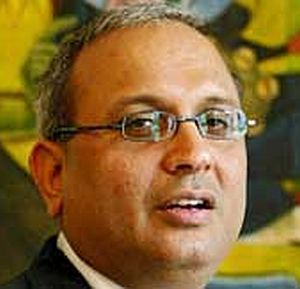 'The Indian market is in a good position right now, with a cyclical upturn underway in the economy.'
'The Indian market is in a good position right now, with a cyclical upturn underway in the economy.'
'The government has done a good job and marshalled its resources well.'
'Ease of doing business, although needed for the economy, is not necessarily a positive for the market.'
Samir Arora, below, left, founder and fund manager, Helios Capital, tells Puneet Wadhwa that in the emerging markets, India will be a much better investment option for investors looking at secular and higher-quality growth.
“As we expect equity markets to do well, the advice for the investor would be to get going,” he says.
Excerpts:
The markets have changed course after the Union Budget in February, backed by foreign flows. Is the worst behind us?
The Indian market is in a good position right now, with a cyclical upturn underway in the economy.
The monsoons are expected to be good, interest rates have been cut and we can expect more (rate) cuts.
Corporate profits, too, should grow by mid-double digits, albeit partly due to the low base of 2015-16.
Though it is difficult to predict the very short term, in general, we think the market should do well.
How are foreign investors looking at emerging markets as an investment option? Where does India stand in their order of preference?
EMs have done well in recent months though the commodity-intensive and more beaten-up markets like Russia and Brazil have done better this year.
India will be a much better choice for anyone wanting to be in EMs and also looking for more secular, higher-quality growth.
Is the threat to the Indian market rally now more from global issues than domestic factors? What’s your advice to someone who wants to invest from a year’s perspective?
Equity investing should be for longer than a year’s perspective, although that is a good start.
I normally ask investors to invest in two or three instalments -- that is mentally easier for an investor to follow, as he feels he is not totally committing to a strategy right away.
Generally speaking, since we expect equity markets to do well, the advice for the investor would to be get going.
The Narendra Modi government completes two years in office this May. Purely from a market/policy perspective, what have been the hits and misses?
The government has done a good job and marshalled its resources well.
Many people are disappointed that private capital investments have not increased.
Even if the government is willing to give fast approvals and in general respond quickly to investor issues, the reality is that Indian corporates in sectors that generally have large capital expenditure are leveraged, enjoy little confidence of the equity markets and are still trying to nurture their current investments.
The government can do little to help them directly at this stage.
What would the market/market participants like to see in policy action?
The positive effects of more responsive government can be seen in much larger foreign direct investment flows as foreign companies take advantage of the positive investment climate in India.
In general, we have learnt over the years to not wait or bet on any policy action of any government.
For, one, these invariably take much longer, and, two, after the initial euphoria, the translation to bottom-line growth for companies takes even longer.
Right now, enjoy the cyclical green shoots in the Indian economy, aided by the country’s generally good governance.
 Have the markets celebrated the monsoon forecast a bit too soon?
Have the markets celebrated the monsoon forecast a bit too soon?
A good monsoon is absolutely crucial to our current bullish stance.
That apart, passage of the bankruptcy Bill will be a huge positive. State elections this year, however, are irrelevant for the markets.
How do you rate the ease of doing business and policies regarding investing in Indian financial markets? Are there any specific bottlenecks or concerns to be addressed?
Ease of doing business, although needed for the economy, is not necessarily a positive for the market.
One reason investors have made more money in India is because entry of new competitors was difficult, allowing existing companies to make super-normal profits.
What are your sector preferences in the current environment?
We like private sector retail lender banks (meaning, those focused on individual lending) and non-bank finance companies the most in the current environment. We also like select stocks in the aviation and infrastructure sectors.
Metal stocks have done well over the past couple of months. Are we out of the woods as regards commodities?
We generally do not want to bet on investments where the price of a commodity has the biggest influence.
Such prices are inherently difficult to predict and subject to too many global factors, difficult to analyse. We would buy private sector retail lenders over all other choices.











